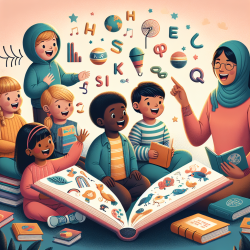Phonological skills are foundational to children's language development, speech intelligibility, and early literacy success. Traditional approaches to phonological intervention have predominantly focused on repetitive drills and isolated sound exercises. However, recent research underscores the effectiveness of integrating literature into phonological therapy. "Once Upon a Sound: Literature-Based Phonological Activities" offers a compelling methodology that leverages children's literature to enhance phonological awareness and skills.
Understanding Phonological Awareness
Phonological awareness refers to the ability to recognize and manipulate the sound structure of language. This includes skills such as identifying rhymes, segmenting words into syllables, and blending sounds to form words. Developing strong phonological awareness is crucial for children, as it lays the groundwork for successful reading and writing.
The Power of Literature in Phonological Intervention
Literature-based phonological activities offer a rich, engaging context for children to develop phonological awareness. By incorporating classic children's literature, "Once Upon a Sound" not only targets specific phonological patterns but also fosters a love for reading. This approach aligns with the cycles remediation model, which emphasizes the importance of meaningful, context-based activities for phonological intervention.
Benefits of Literature-Based Phonological Activities
- Enhanced Engagement: Children are more motivated and engaged when therapy activities are grounded in stories and characters they love.
- Contextual Learning: Literature provides a natural context for introducing and practicing phonological patterns, making learning more meaningful and effective.
- Improved Literacy Skills: Integrating phonological activities with literature not only improves speech intelligibility but also supports early literacy development.
- Parental Involvement: Using well-known children's books makes it easier for parents to reinforce phonological skills at home, creating a supportive learning environment.
Implementing Literature-Based Phonological Activities
"Once Upon a Sound" is structured around six key sections, including an overview of the program, primary and secondary target patterns, and a comprehensive appendix with resources for implementation. The program provides detailed lesson plans based on children's literature, targeting specific phonological patterns through a variety of engaging activities. These activities are designed to be flexible, allowing speech-language pathologists (SLPs) to tailor the program to meet the individual needs of each child.
Key Components of Effective Implementation
- Selection of Literature: Choose books that are age-appropriate, engaging, and rich in the target phonological patterns.
- Activity Centers: Organize therapy sessions into different centers, such as listening, practice, and art centers, to provide varied and interactive learning experiences.
- Home Practice: Include activities and materials for parents to use at home, reinforcing the phonological skills learned during therapy sessions.
- Monitoring Progress: Use the program's data forms and tools to track each child's progress and adjust the intervention as needed.
Challenges and Recommendations
While literature-based phonological activities offer numerous benefits, there are challenges to consider. Access to a wide range of children's literature and the need for SLPs to be familiar with the stories can be potential barriers. Additionally, ensuring that activities are appropriately challenging and engaging for each child requires careful planning and adaptation.
To address these challenges, SLPs should build a diverse library of children's books and collaborate with educators and parents to identify suitable literature. It's also important to be flexible in adapting activities and to seek continuous feedback from children to ensure that the activities remain engaging and effective.
Conclusion
Literature-based phonological activities represent a valuable and innovative approach to phonological intervention. By harnessing the power of children's literature, SLPs can provide engaging, context-rich therapy that not only improves phonological skills but also nurtures a love for reading and learning. "Once Upon a Sound: Literature-Based Phonological Activities" offers a comprehensive framework for integrating literature into phonological therapy, promising a more enjoyable and effective intervention for children.
To read the original research paper, please follow this link: Once Upon a Sound: Literature-Based Phonological Activities.










